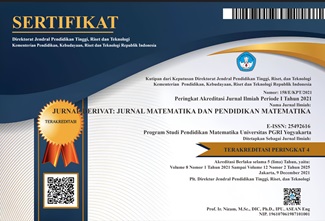Disposisi Matematis Dan Kemandirian Belajar Mahasiswa Pada Perkuliahan Daring Berbantuan Google Classroom Masa Covid-19
DOI:
https://doi.org/10.31316/j.derivat.v7i2.1068Abstract
This study aims to analyze the mathematical disposition and self-regulated learning of online lectures with the help of Google Classroom. This type of research is descriptive quantitative. This study's subjects were 34 students of the first semester of the Mathematics Education Study Program consisting of 11 male students and 23 female students determined by the saturated sampling method. From the research results, it can be concluded that students' mathematical disposition through learning assisted by Google Classroom has high criteria. The mathematical disposition of male and female students through learning assisted by Google Classroom has high criteria. Still, the level of mathematical disposition of male students is slightly higher than female students. Meanwhile, student self-regulated learning with the help of Google Classroom obtains very high criteria. For male and female students, both have very high learning independence criteria in carrying out learning with the help of Google Classroom.
Keywords: Mathematical Disposition, Self-regulated learning, Google Classroom, Online Lectures, Gender
Downloads
Published
Issue
Section
Citation Check
License
Authors who publish with this journal agree to the following terms:
-
Authors retain copyright and grant the journal right of first publication with the work simultaneously licensed under a Creative Commons Attribution-ShareAlike 4.0 International License that allows others to share the work with an acknowledgment of the work's authorship and initial publication in this journal.
- Authors are able to enter into separate, additional contractual arrangements for the non-exclusive distribution of the journal's published version of the work (e.g., post it to an institutional repository or publish it in a book), with an acknowledgment of its initial publication in this journal.
- Authors are permitted and encouraged to post their work online (e.g., in institutional repositories or on their website) prior to and during the submission process, as it can lead to productive exchanges, as well as earlier and greater citation of published work (See The Effect of Open Access).







